- Home
- C. L. Moore
Judgment Night
Judgment Night Read online
Judgment Night
C.L. Moore
Copyright
Diversion Books
A Division of Diversion Publishing Corp.
443 Park Avenue South, Suite 1008
New York, NY 10016
www.DiversionBooks.com
Copyright © 1952 by C.L. Moore
All rights reserved, including the right to reproduce this book or portions thereof in any form whatsoever.
This is a work of fiction. Names, characters, places and incidents either are the product of the author’s imagination or are used fictitiously. Any resemblance to actual persons, living or dead, events or locales is entirely coincidental.
For more information, email [email protected]
First Diversion Books edition September 2015
ISBN: 978-1-68230-113-5
Also by C.L. Moore
Northwest Smith
Doomsday Morning
Jirel of Joiry
Black God’s Kiss
Shambleau
The Best of C.L. Moore
Judgment Night
Here in the flickering darkness of the temple, a questioner stood silent before the Ancients, awaiting an answer he knew he could not trust.
Outside were the soft green hills and the misty skies of Ericon, but not even a breath of that sweet rainy air blew through the portals of the House of the Ancients. Nothing temporal ever touched them now. They were beyond all time and change. They had lived here since the first silver ships came swarming through the Galaxy; they would never die.
From this world of Ericon the pulse of empire beat out through interstellar space, tides waxing and ebbing and breaking in distant thunder upon the shores of the planets. For the race that held Ericon held the Galaxy.
Kings and emperors beyond counting had stood as this questioner stood now, silent before the Ancients in their star-shot dark. And the questioners were always answered—but only the Ancients knew if the answer meant its hearer’s doom.
For the Ancients were stern in their own strange code. No human minds could fathom it. No human ever knew if his race had met their rigid tests and passed them, or if the oracle he received was a mercy-blow that led by the quickest road to destruction.
Voiceless, unseen behind their high altar, the Ancients answered a question now. And small in the tremendous shaking darkness of the temple, he who had come to satisfy a doubt stood listening.
“Let them fight,” the unspeaking oracle said. “Be patient a little longer. Your hour is almost here. They must have their chance in the final conflict that is nearly upon them now—but you know how blind they are. Be patient. Be silent. Watch all they say and do, but keep your secret—”
The hundred emperors of Ericon looked down gravely out of their hundred pasts upon Juille, striding with a ring of spurs through the colored twilight of their sanctum.
“If I were a man,” said Juille, not turning her head, “maybe you’d listen to me.”
No answer.
“You used to want a son,” reminded Juille, and heard her own voice echo and re-echo high up among the arches where sunlight came pouring through plastics the color of jewels.
“I know, I know,” the old emperor said from the platform behind her. “When I was your age, I was a fool, too.”
Juille flashed him a sudden grin over her shoulder. Once in a while even now, she thought, you could catch a glimpse of the great and terrible man her father had once been.
Out of their crystal-walled niches his predecessors and hers looked down as she strode past them. Here were men who had conquered the Galaxy world by reluctant world, great warriors who had led their armies like devouring flame over alien planets and alien seas and the passionless seas of space. Here were emperors who knew the dangerous ways of peace and politics, who had watched civilization mount tier upon shining tier throughout the Galaxy.
She turned at the end and came back slowly along the rows of later rulers, to whom peace and the Galaxy and a rich heritage of luxury had been an old story. Pride of race was strong upon all these faces. People on outworld planets had worshiped them as gods. All of them had been godlike in the scope of their tremendous powers, and the knowledge of it was vivid upon their faces. Not many men have looked up by night with a whole planet for a throne, to watch the stars that are their empire parading in slow review across the heavens. Such knowledge would give even a weak face an appalling pride and dignity, and none of the emperors of Ericon had been weak. Men like that would not live very long upon the throne of the Galaxy of Lyonese.
The last three faces in the row had known humiliation almost as vast in its scope as the great scope of their pride. For now there were rebellious stars in the nightly array across the sky. And that fierce trouble showed in the eyes and the grimly lined faces of the emperors who had been defied.
The last portrait of all was the portrait of Juille’s father.
She stood in silence, looking up at the young emperor in the niche, and the old emperor, arms folded on the platform rail, leaned and looked down across a gulf of many years and much hard-won experience, into the face of a stranger.
“Yes,” the emperor said gravely, “I was a fool too, then.”
“It was a fool’s work to let them live,” Juille told him hotly. “You were a great warrior in those days, father. Maybe the greatest the Galaxy ever had. I wish I’d known you then. But you weren’t great enough. It takes a great man to be ruthless.”
The emperor looked at her under the shadow of his brows. “I had a hard problem then,” he said, “—the same problem you’re facing now. If I’d chosen the solution you’re choosing, you probably wouldn’t be here today. As a matter of fact, you might be sitting in a cave somewhere, gnawing a half-cooked bone.”
Juille gave him a bright violet glare. “I’d have wiped them out,” she declared furiously, “if it meant the end of the empire. I’d have killed every creature with a drop of H’vani blood, and razed every building on every world they had, and sown the rocks with radium! I’d have left their whole dead system hanging in the sky as a warning for all time to come. I’ll do it yet—by the Hundred Emperors, I will!”
“The Ancients permitting, maybe you will, child.” The old emperor stared down into his own young face in the niche. “And maybe you won’t. The time may come when you’re old enough to realize what warfare on that scale would mean, even to the victors. And there’d be no victors after a fight like that.”
“But father, we’ll have to fight. Any day—any hour—”
“Not yet awhile, I think. The balance is still too even. They have the outer fringes with all their resources, but we…well, we have Ericon and that counts for a lot. More than the men and machines we have. More than all the loyal worlds. Nobody knows how many dynasties there were before ours, but everyone knows that the race on Ericon rules the Galaxy.”
“As long as they hold Ericon. But sooner or later the balance is going to tip and they’ll attack us. We’ll have to fight.”
“We’ll have to compromise.”
“We could cut our throats and be done with it.”
“That’s what I’m trying to prevent. How much of civilization do you think would survive any such holocaust as that? It would mean our ruin even if we won. Come up here, child.”
Juille gave him a searching, sidewise glance and then turned slowly, hooking her thumbs into her sword belt, and mounted the shallow steps to the dais. Here in orderly array were the worlds of her father’s empire, stretching in a long row left and right along the platform. She watched a little sulkily as the emperor laid a possessive hand upon the great green globe of Ericon in the center of the row and set it whirling beneath his fingers. The jewels that marked its cities flashed and blurred.
“This is the empire, Juille,” he said. “This one world. And the empire means a great deal more than—well, a row of conquered planets. It means mercy and justice and peace.” He shook his head unhappily. “I can’t administer all that any more to every world in the Galaxy. But I won’t throw the loyal worlds after the ones we’ve lost if any word of mine can prevent it.” He let his hand fall from the spinning globe. Its turning slowed, and the jeweled cities flashed and faded and twinkled over the curved surface. “After all,” the old man said, “isn’t peace as we’ve known it worth—”
“No,” said Juille flatly. Her father looked at her in heavy silence. “I can do that to Ericon,” she told him, and with a slap of her hand set the big globe spinning again, until all the glittering cities blurred upon its sides. “As long as I can, the empire is ours. I won’t share it with those hairy savages!”
The emperor was silent, looking at her from under his brows.
After a slightly uncomfortable pause, the girl turned away.
“I’m leaving,” she said briefly.
“Where?”
“Off-world.”
“Juille—”
“Nothing rash, father, I promise. I’ll be back in time for the council. And I’ll have a majority vote, too. You’ll see the worlds agree with me.” Her voice softened. “We’ve got to fight, father. Everyone says so but you. Nothing anyone can do will prevent it now.”
Looking down, her father saw on the girl’s face a look he knew very well—the terrible pride of a human who has tasted the attributes of divinity, who rules the turning worlds and the very stars in their courses. He knew she would not relent. He knew she could not. There were dark days ahead that he could not alter.
And he wondered with sudden self-doubt if after all, in her frightening certainty, she might be right.
Juille strode down the hallway that led to her living quarters, her spurs ringing with faint rhythmic music and the scabbard of her fire sword slapping against her thigh.
There had been many tremendous changes in the Lyonese culture even in her own lifetime, but perhaps none greater than the one which made it possible for her to take the part a son might have taken, had the emperor produced a son. Women for the past several generations had been turning more and more to men’s professions, but Juille did not think of herself as filling a prince’s shoes, playing a substitute role because no man of the proper heritage was available. In her the cool, unswerving principles of the amazon had fallen upon fertile ground, and she knew herself better fitted and better trained for the part she played than any man was likely to be.
Juille had earned her military dress as a man might have earned it, through lifelong training in warfare. To her mind, indeed, a woman was much more suited to uniform than a man, so easily can she throw off all hampering civilian ideas once she gives her full loyalty to a cause. She can discard virtues as well as vices and live faithfully by a new set of laws in which ruthless devotion to duty leads all the rest.
For those women who still clung to the old standards, Juille felt a sort of tolerant contempt. But they made her uneasy, too. They lived their own lives, full of subtle nuances she had never let herself recognize until lately. Particularly, their relationship with men. More and more often of late, she had been wondering about certain aspects of life that her training had made her miss. The sureness and the subtlety with which other women behaved in matters not associated with war or politics both annoyed and fascinated Juille. She was, after all, a woman, and the uniform can be discarded as well as donned. Whether the state of mind can be discarded, too—what lay beneath that—was a matter that had been goading her for a long while. And now it had goaded her to action.
In her own rooms she gave an abstracted glance to the several women who hurried forward at her entrance, said briefly, “Out. And send me Helia,” and then leaned to the mirror and stood there peering with solemn intentness at her own face under the shining helmet. It was a sexless face, arrogant and intolerant, handsome as her fluted helmet was handsome, with the same delicately fine details and well-turned curves. The face and the helmet belonged together.
She saw a figure move shadowily in the doorway reflected beyond her shoulder, and said without moving, “Helia—how will I look in dresses? Would you say I’m pretty?”
“You certainly aren’t ugly, highness,” Helia told her gruffly. It was as much of a compliment as she had ever extracted from the amazon ex-warrior who had been Juille’s childhood nurse and girlhood tutor in the arts of war. She had a seamed face, scarred from combat in the revolution zones, and the twinkling narrow eyes of a race so old that Juille’s by comparison seemed to lack a history. Helia was an Andarean. The tide of conquest had swept over the Galaxy and ebbed again since the day of Helia’s race and its forgotten glory. Perhaps somewhere under the foundations of the Lyonese cities today lay rubble-filled courses the Andareans had once built upon the ruins of cities yet older. No one remembered now, except perhaps the Ancients.
Juille sighed.
“I’ll never find out from you,” she said.
“You’ll get an answer on Cyrille, highness, and you may not like it.”
Juille squared her shoulders. “I hope you’ve kept your mouth shut about all this. Is the ship ready?”
“It is. And I haven’t told a soul. But what your father would say, highness, if he knew you were going to a notorious resort like Cyrille—”
“Perfectly respectable people go there, and you know it. Anyhow, I’m going incognito. And if I hear another word about it I’ll have you whipped.”
Helia’s lipless mouth compressed in disapproval.
“Incognitos don’t always work, highness. You should know how secrets leak out around a palace.” She caught a dangerous violet glance and subsided, muttering. She knew that stubborn look upon Juille’s fine, hard features. But she knew the dangers upon Cyrille, too. She said, “You’re taking me with you, I hope?”
“One more word and I won’t,” Juille warned her. “One more word!” She straightened from the mirror, after one last curiously appraising glance. “Come along, if you want to. I’m leaving.”
At the door a small, smoothly furred creature rippled past Juille’s ankles with an ingratiating murmur and looked up out of enormous eyes. Juille stooped to let it climb upon her shoulder, where it sat balancing easily and staring about it with the grave animal dignity and the look of completely spurious benignity and wisdom that distinguishes all llar. Very few on Ericon own such pets. They were perhaps the true aborigines of Ericon themselves, for they had lived here, and upon no other world, from time immemorial, reserved little creatures of fastidious habits and touchy, aloof ways.
“I’ll take both of you,” Juille said. “And I expect you’ll be just about equally in the way. Come on.”
Their ship spiraled up through the rainy gray air of Ericon, leaving the green mountains farther and farther below with each wide circle, until the surface of the planet looked like undulating green fur, soft with Ericon’s eternal summer. Presently they were above the high clouds, and rain ceased to beat softly against the glass.
The little ship was riding a strictly prescribed course. The sternest of the Ancients’ few restrictions upon human life on Ericon was the restriction on air traffic. All passage was forbidden over the great forests in which the living gods dwelt. The Galaxy’s vast space liners had of their own weight to establish an orbit and transact all direct business through tenders, but tenders and private ships plying Ericon’s forbidden airways complied with rigid rules about height and course. Because of them, Ericon was a world of surface traffic except in the rarest instances.
Juille sent her vessel flying along an invisible airway of strict boundaries. Presently they overtook twilight and plunged into the evening air that was darkening over the night side of the world. A great luminous bubble floated in the dark ahead, too large for a star, too small for a moon, rolling along its course around Ericon. Helia scowled at it.
&n
bsp; This little pleasure world swinging opalescent upon its orbit housed the tangible distillation of all pleasure which a hundred emperors had made possible in the Galaxy. No human desire, however fantastic, went unfulfilled upon Cyrille so long as the client paid for his fantasy. It is an unhappy commentary upon human desires that the reputation of such a place must inevitably be bad.
Juille’s ship hovered up below the shining curve of the bubble and a dark square opened in the curve. Then luxury reached out in the form of a tractor beam to take all navigation out of her hands. They rose with smooth speed through a shaft of darkness.
Because privacy and anonymity were prerequisites of many patrons here, they saw no one and were seen by none. The ship came to a velvety stop; Juille opened its door and stepped out straight into a cubicle of a room whose walls glowed in a rosy bath of indirect sunlight. Low couches made a deeply upholstered ledge all around the room. There was a luminous panel beside a closed door. Otherwise—nothing.
Helia climbed out disapprovingly. “I hope you know what you’re doing, highness,” she said. For answer, Juille stepped to the luminous panel and let her shadow fall across it. Instantly a voice of inhuman sweetness said dulcetly:
“Your pleasure?”
“I will have,” Juille said in a musing tone, “a lounge with sunlight and an ocean view—no particular planet—and a bedroom that—Oh, something restful and ingenious. Use your own ideas on that. A water bath with the emphasis on coolness and refreshment. Now let me see the public rooms for today.”
“Immediately,” the dulcet voice cooed. “The suite will be ready in five minutes. Refreshment?”
“No food yet. What have you?”
A breath as soft and cool as a mountain breeze at dawn sighed instantly through the room. It smelled faintly of pine. Gravity lessened almost imperceptibly underfoot, so that they seemed to be blowing with the breeze, though they did not move.

 The Complete Jirel of Joiry
The Complete Jirel of Joiry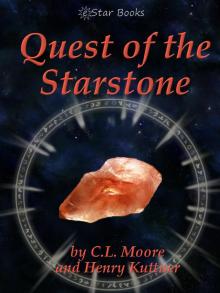 Quest of the Starstone
Quest of the Starstone The Tree of Life
The Tree of Life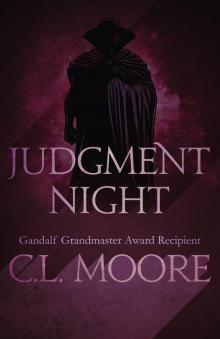 Judgment Night
Judgment Night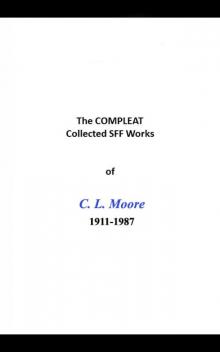 The COMPLEAT Collected SFF Works 1911-1987
The COMPLEAT Collected SFF Works 1911-1987 Northwest of Earth
Northwest of Earth No Boundaries
No Boundaries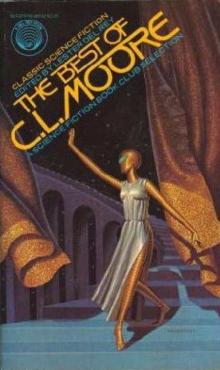 The Best of C. L. Moore
The Best of C. L. Moore Doomsday Morning M
Doomsday Morning M Shambleau and Others M
Shambleau and Others M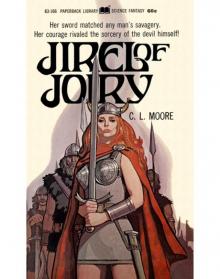 Jirel of Joiry
Jirel of Joiry Judgment Night M
Judgment Night M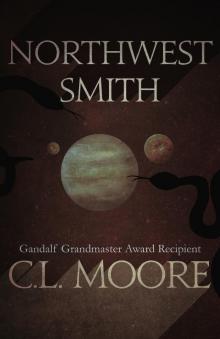 Northwest Smith
Northwest Smith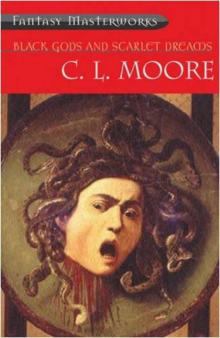 Black Gods and Scarlet Dreams
Black Gods and Scarlet Dreams